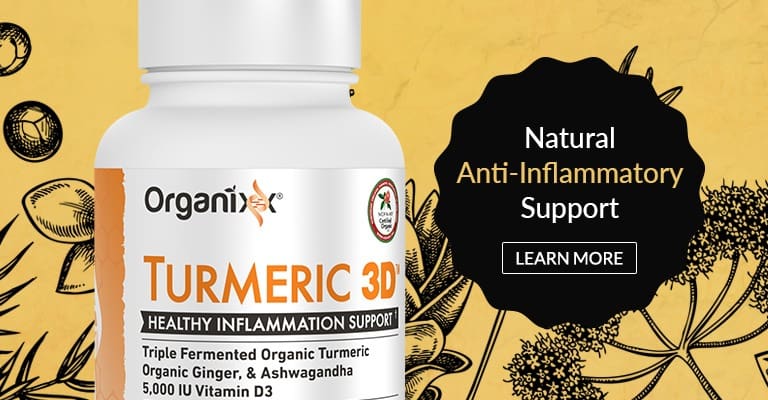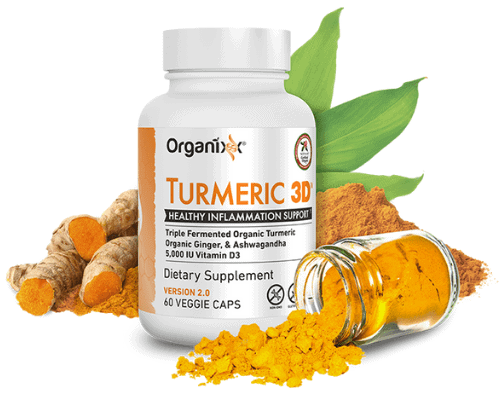Empowering You Organically – Season 11 – Episode 89
Title: Turmeric and Black Pepper: The Best Way to Take Turmeric?
Hosts: Jonathan Hunsaker, TeriAnn Trevenen
Description: You’ve likely heard about the many health benefits of turmeric (Curcuma longa L.) and its compound curcumin. But did you know that it can be difficult to “unlock” the nutrients in turmeric so your body can actually take full advantage of them? Tune in to today’s episode to unlock the magic of turmeric!
* * *
FEATURED PRODUCT
A Powerful Antioxidant with Anti-Inflammatory Properties Supports Healthy Joints
- MAINTAIN HEALTHY INFLAMMATION LEVELS:Curcumin, the main healing compound found in turmeric, helps curb inflammation and supports your body in maintaining healthy inflammation levels.
- ENHANCE YOUR MOOD:Researchers in a recent study studies found clear evidence that the compounds in turmeric helped maintain a healthy mood and disposition.
- SUPPORT HEALTHY JOINTS:In addition to lowering overall pain and inflammation, curcumin has been shown to assist in pain reduction and inflammation, helping to maintain healthy joints.
- MAXIMUM BIOAVAILABILITY:The fermentation process helps maximize your body’s intake of the amazing nutrients in this supplement!
***
Turmeric and Black Pepper: The Best Way to Take Turmeric?
You’ve likely heard about the many health benefits of turmeric (Curcuma longa L.) and its compound curcumin. But did you know that it can be difficult to “unlock” the nutrients in turmeric so your body can actually take full advantage of them?
One popular way to make the compounds in turmeric more bioavailable (absorbable and usable to the body) is to pair it with another popular cooking spice: black pepper [1]. But what if there was a better way than combining turmeric and black pepper? A way to boost turmeric’s bioavailability, allowing it to more safely and effectively support the natural healing process?
The Healing Power of Turmeric
Turmeric is a staple remedy from the traditional medicine systems of the Far East that has gained widespread popularity throughout the West in recent years as a “super” spice.
Turmeric’s many health-supportive properties are attributed to curcumin, a key component of turmeric that’s associated with longevity. Curcumin is documented in the scientific literature as offering powerful support for the cardiovascular, neurological, metabolic, immune, and cellular systems. It’s also the part of turmeric that gives this root spice its rich, golden yellow color.
But the truth of the matter is that humans have a difficult time getting all the health benefits from turmeric when consuming the spice all by itself. Research shows that only a very small portion of it is assimilated into the body when eaten in isolation.
This is why many natural health experts suggest consuming turmeric along with black pepper (Piper nigrum). Black pepper contains a unique “bio-enhancer” compound known as piperine that significantly boosts turmeric’s bioavailability – by as much as 2,000 percent, in fact.
This is the reason why many turmeric and curcumin supplement products on the market today contain either black pepper or piperine.
The Problem: Black Pepper Isn’t Good for Everyone
This pairing approach of turmeric and black pepper comes with limitations, however, as too much black pepper can actually be detrimental to health – especially in people with gastrointestinal issues.Research published in the American Journal of Gastroenterology found that consuming black pepper in excess can damage the mucosal lining of the gut, potentially causing bleeding or other injuries.
Consuming high amounts of black pepper, this same study found, is akin to taking the painkiller drug aspirin [2]. In other words, aspirin represents a similar threat to the gut lining in terms of its tendency to cause serious erosions and ulcers in the intestinal tract [3].
This isn’t to say that black pepper is inherently dangerous, and there’s no need to toss out the pepper shaker just yet. After all, the amounts of black pepper required to induce such harm are far greater than what the average person consumes in their food on a daily basis.
There’s also evidence to show that taking curcumin along with just piperine, black pepper’s primary alkaloid, is typically safe and causes “no adverse effects [4].”
Even so, there’s always the possibility that someone might react negatively to this combination – especially when taking very high doses of turmeric or curcumin for therapeutic purposes.
For this reason, science set out to determine whether or not it was possible to retain turmeric’s full bioavailability without the need for black pepper, piperine, or any other additive. And the good news is, it is possible.
Fermentation Increases the Power of Turmeric BETTER Than Black Pepper
As it turns out, by fermenting turmeric its active constituents can be drawn out and made more potent in a way similar to, and potentially even greater than, black pepper.
Here’s another reason why fermented turmeric may be superior to turmeric and black pepper. Besides possibly upsetting a person’s digestive system, black pepper is known to interfere with a process known as glucuronidation that’s necessary for eliminating toxins from the body [5].
Put simply, too much black pepper can cause a buildup of xenoestrogens (harmful chemicals found in plastic and other everyday products) and other toxins that would otherwise be quickly eliminated from the body [6].
With simple fermentation, however, there’s little-to-no risk of these types of complications. That’s because there’s nothing like black pepper getting in the way to block the body’s important detoxification pathways.
It’s rather like eating fresh turmeric, which still contains all of the volatile (essential) oils that help to deliver the herb’s active compounds throughout the body. Fermentation may even go a step beyond this by further optimizing turmeric’s absorption potential.
Research conducted on rat models found that fermented turmeric is, indeed, the best form of turmeric because it contains the most antioxidant power. Compared to ground turmeric in powder and probiotic forms, fermented turmeric led to substantially higher plasma antioxidant concentrations in test subjects [7].
In terms of how it affects the liver, fermented turmeric was shown in a paper out of South Korea to be powerfully hepatoprotective, meaning it shields the liver from damage.
Not only that, but fermented turmeric was also shown to help improve the liver’s functional detoxification potential [8] – as opposed to black pepper-potentiated turmeric that can inhibit natural detoxification.
Fermented turmeric also contains more curcumin (the beneficial compound) than unfermented turmeric, by volume. In addition to improving both its antioxidant and antimicrobial capacity, fermenting turmeric draws out an impressive 11% more curcumin compared to what’s found in raw turmeric.
Fermentation also makes turmeric 3.1 times more effective at scavenging oxidizing free radicals from the body [9].
Another area where fermented turmeric has a leg up on both unfermented turmeric and turmeric combined with black pepper is in the area of inflammation.
Research published by The Korean Society for Applied Microbiology and Biotechnology found that fermented turmeric is a powerful anti-inflammatory, possessing the ability to inhibit pro-inflammatory cytokines much more effectively than any other known form of turmeric. Fermented turmeric was further shown in this same study to protect against acute anaphylactic, or allergic, reactions [10].
From an antimicrobial perspective, fermented turmeric shows incredible potential against a wide variety of pathogenic bacteria, including drug-resistant “superbugs.”
Research out of the Middle East found that fermented turmeric provides broad-spectrum protection against harmful bacteria such as Escherichia coli (E. coli), Streptococcus agalactiae, Staphylococcus aureus (Staph), Entreococcus faecalis, Methicillin-Resistant Staphylococcus aureus (MRSA), Klebsiella pneumonia, and Pseudomonas aeruginosae [11].
Research out of China found that fermented curcumin can be a powerful weapon against high cholesterol, also known as hyperlipidemia. While unfermented curcumin showed minimal-to-no benefits during the evaluation, its fermented counterpart significantly reduced serum lipid levels in test models [12].
Fermented Turmeric Increased Fat Loss in Animal Test Subjects
Fermented turmeric also shows promise in fighting another undesirable form of fat: the obesity kind.
Research out of South Korea found that consumption of fermented turmeric can alter the expression of certain genes involved with lipid accumulation, effectively preventing them from communicating to the body that it’s time to pack on extra pounds [13].
Related research published a year later, also out of South Korea, reiterated these findings while building upon them. Obese rats fed a high-fat diet not only didn’t gain more weight when also consuming fermented turmeric, but they further lost weight as a result of consuming the herb as part of their daily eating routines [14].
Preventing Impairment of Learning and Memory
Research has shown there are brain benefits associated with fermented turmeric as well. Among the findings fleshed out in a paper published in the journal BMC Complementary and Alternative Medicine was evidence suggesting that fermented turmeric has the potential to mitigate memory impairment while supporting optimized learning and memory ability in mice [15].
While more research needs to be done, the evidence so far seems clear… fermentation is the key to “unlocking” the incredible healing potential of turmeric, while avoiding the potential side effects of combining turmeric and black pepper.
* * *
Subscribe to Empowering You Organically
Never miss an episode!
APPLE PODCASTS SPOTIFY GOOGLE PODCASTS
–
Episode 89 – Turmeric and Black Pepper: The Best Way to Take Turmeric?






